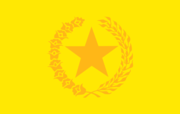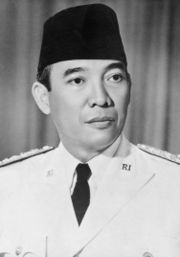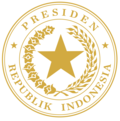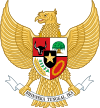رئيس إندونيسيا
| ||||||||||||||||||||||||||||||||||
| ||||||||||||||||||||||||||||||||||
رئيس جمهورية إندونسيا (إندونيسية: Presiden Republik Indonesia)، هو رأس الدولة ورئيس حكومة جمهورية إندونسيا. يقود الرئيس السلطة التنفيذية للحكومة الإندنيسية وهو القائد الأعلى للقوات المسلحة الوطنية الإندونيسية.
في 24 أكتوبر 2014، أصبح جوكو ويدودو الرئيس السابع والحالي لإندونسيا.
. . . . . . . . . . . . . . . . . . . . . . . . . . . . . . . . . . . . . . . . . . . . . . . . . . . . . . . . . . . . . . . . . . . . . . . . . . . . . . . . . . . . . . . . . . . . . . . . . . . . . . . . . . . . . . . . . . . . . . . . . . . . . . . . . . . . . . . . . . . . . . . . . . . . . . . . . . . . . . . . . . . . . . . .
التاريخ


الرئاسة
متطلبات الترشح للمنصب
دستور 1945: يجب على المرشح لمنصب الرئيس أن يكون إندونيسي الأصل.
الدستور المؤقت: على المرشح الرئاسي أن يكون مواطناً إندونيسياً لا يقل عمره عن 30 عاماً. لا يمكن أن يكون المرشح الرئاسي شخصاً غير مرغوب فيه أو ليس من حقه المشاركة في الانتخابات. كما يجب ألا يكون مرتبط بأي مؤسسات أخرى. الشخص الذي يعتبر غير مرغوب فيه أو من حقه في المشاركة في الانتخابات. كما أنه مطلوب من عدم المشاركة مع أي شركات خاصة.
السلطات
المساعدة في أداء الواجبات
خط الخلافة والعزل
ما بعد الئراسة
قائمة الرؤساء
|
Note: — denotes acting president |
| No. | Portrait | Name (Lifespan)
|
Term of office | Party | Vice president | ||||
|---|---|---|---|---|---|---|---|---|---|
| Took office | Left office | Election | Time in office | ||||||
| 1 | 
|
Sukarno (1901–1970) |
18 August 1945 | 12 March 1967 | 1945 | 21 years, 206 days | Independent | 1 | Mohammad Hatta |
| Vacant (1 December 1956 – 12 March 1967) | |||||||||
| Declared Indonesia's independence from colonial powers. Presided during the Indonesian National Revolution and the first national elections. One of the founding fathers of the Non-Aligned Movement and hosted the 1955 Bandung Conference. Called for 'Guided Democracy' following the collapse of 10 governments during the 1950s, with Nasakom as its principal ideology. Acceded Western New Guinea. Opposed the formation of Malaysia and began Konfrontasi. Signed Supersemar in 1966 following the assassination of 6 generals. | |||||||||
| — | 
|
Suharto (1921–2008) |
12 March 1967 | 27 March 1968 | — | 1 years, 15 days | Military | Vacant | |
| Sukarno transferred key presidential powers to Suharto on 11 March 1966 in a vaguely worded letter of authority known as Supersemar and surrendered his powers on 20 February 1967, but he was not formally relieved of his presidential title by the MPRS until 12 March 1967. On 12 March 1967, the MPRS agreed to withdraw its mandate from Sukarno and remove him as president. Suharto replaced Sukarno as acting president until 27 March 1968, when he was formally elected as the second president of Indonesia. | |||||||||
| 2 | 27 March 1968 | 23 March 1973 | 1968 | 30 years, 55 days | Golkar (supported by the military) |
Vacant | |||
| 23 March 1973 | 11 March 1978 | 1973 | 2 | Hamengkubuwono IX | |||||
| 11 March 1978 | 11 March 1983 | 1978 | 3 | Adam Malik | |||||
| 11 March 1983 | 11 March 1988 | 1983 | 4 | Umar Wirahadikusumah | |||||
| 11 March 1988 | 11 March 1993 | 1988 | 5 | Sudharmono | |||||
| 11 March 1993 | 11 March 1998 | 1993 | 6 | Try Sutrisno | |||||
| 11 March 1998 | 21 May 1998 | 1998 | 7 | B. J. Habibie | |||||
| First president from a military background. The longest-serving president with an over-30-year tenure. Seized power from Sukarno through Supersemar in 1966. Declared a New Order military dictatorship. Dismantled the Communist Party of Indonesia and oversaw the mass murder and imprisonment of thousands of suspected communists throughout the archipelago. Ended Konfrontasi and initiated friendly relationships with neighbouring countries of Malaysia and Singapore, and Indonesia became a founding member of the Association of Southeast Asian Nations and the Asia-Pacific Economic Cooperation. Severed ties with China and other communist countries in the region. Incorporated Western New Guinea into Indonesia. Annexed East Timor. Oversaw great economic and infrastructural development but rampant corruption within the bureaucracy and government. Resigned following the collapse of the Indonesian economy during the 1997 Asian financial crisis and the 1998 riots. | |||||||||
| 3 | 
|
B. J. Habibie (1936–2019) |
21 May 1998 | 20 October 1999 | — | 1 years, 152 days | Golkar | Vacant | |
| First, and to date the only, president (aside from acting presidents) who was born outside of Java. First vice president to become president. Took power following Suharto's resignation. Oversaw Indonesia's democratic transition. East Timor declared independence from Indonesia. Released thousands of political prisoners. Decided not to run for a full term. | |||||||||
| 4 | 
|
Abdurrahman Wahid (1940–2009) |
20 October 1999 | 23 July 2001 | 1999 | 1 years, 276 days | PKB | Vacant (20–21 October 1999) | |
| 8 | Megawati Sukarnoputri | ||||||||
| First executive branch officer (president and vice president) to have come from a religious background. Head of Nahdlatul Ulama and grandson of its founder. Term embroiled by a number of scandals and corruption cases. Abolished all remaining legal discrimination against Chinese Indonesians. Attempts to reform the military and remove its political power were not taken kindly by military actors. Attempted to dissolve parliament, but was himself impeached and removed from office by parliament. | |||||||||
| 5 | 
|
Megawati Sukarnoputri (born 1947) |
23 July 2001 | 20 October 2004 | — | 3 years, 89 days | PDI-P | Vacant (23–26 July 2001) | |
| 9 | Hamzah Haz | ||||||||
| First female president of Indonesia and the first to be born after the proclamation of independence in 1945. Oldest daughter and second child of President Sukarno, first president born to another president. First female vice president and the first vice president to be born after 1945. Came to power following the removal of Abdurrahman Wahid. Presided during a period of economic growth. Bali was attacked by a major bombing in 2002 by Jemaah Islamiyah. Lost reelection bid to her former coordinating minister and in a later rematch. | |||||||||
| 6 | 
|
Susilo Bambang Yudhoyono (born 1949) |
20 October 2004 | 20 October 2009 | 2004 | -1994 years | Demokrat | 10 | Jusuf Kalla |
| 20 October 2009 | 20 October 2014 | 2009 | 11 | Boediono | |||||
| The first president to be directly elected by popular vote. Second president from a military background. Parts of Sumatra were devastated by the 2004 Indian Ocean earthquake and tsunami. Jemaah Islamiyah was severely weakened following efforts by Detachment 88. Indonesia was classified as part of MINT and became a member of the G20 during his presidency. Elected to a second term in 2009. Indonesia formed the Bali Democracy Forum and became a founding member of the Open Government Partnership. He presided over consistent economic growth. During his second term, the Democratic Party was embroiled by many corruption scandals. | |||||||||
| 7 | 
|
Joko Widodo (born 1961) |
20 October 2014 | 20 October 2019 | 2014 | -2004 years | PDI-P (2014–2024) Independent (since 2024) |
12 (10) |
Jusuf Kalla |
| 20 October 2019 | 20 October 2024 | 2019 | 13 | Ma'ruf Amin | |||||
| The first president not to have emerged from the country's political elite or to have been an army general.[2] First president to have been a regional politician (mayor for about 7 years, governor for nearly 2 years) and the first to be born after the recognition of independence in December 1949. Initiated the process to move the capital of Indonesia from Jakarta to Nusantara. Elected to a second term in 2019. | |||||||||
| 8 | 
|
Prabowo Subianto (born 1951) |
20 October 2024 | Incumbent | 2024 | 62 days | Gerindra | 14 | Gibran Rakabuming Raka |
| Retired general and former commander of the Special Forces Command (Kopassus) and Army Strategic Reserve Command (Kostrad). Lost twice against his predecessor in 2014 and 2019, but was appointed as minister of defense in 2019. His 96.2 million votes are the highest received by any candidate in a democratic election in Indonesia, surpassing Joko Widodo's 85.6 million votes in 2019. First president in Indonesia's history to have a younger predecessor. The oldest president to be sworn in for the first term at age 73. Third president from a military background. | |||||||||
. . . . . . . . . . . . . . . . . . . . . . . . . . . . . . . . . . . . . . . . . . . . . . . . . . . . . . . . . . . . . . . . . . . . . . . . . . . . . . . . . . . . . . . . . . . . . . . . . . . . . . . . . . . . . . . . . . . . . . . . . . . . . . . . . . . . . . . . . . . . . . . . . . . . . . . . . . . . . . . . . . . . . . . .
حسب العمر
| # | President | Born | Age at start of presidency |
Age at end of presidency |
Post-presidency timespan |
Lifespan | |
|---|---|---|---|---|---|---|---|
| توفي | العمر | ||||||
| 1 | سوكارنو | 6 June 1901 | 44 years, 73 days 18 August 1945 |
65 years, 279 days 12 March 1967[أ] |
3 years, 101 days | 21 June 1970 | 69 years, 15 days |
| 2 | سوهارتو | 8 June 1921 | 45 years, 277 days 12 March 1967 |
76 years, 347 days 21 May 1998[ب] |
9 years, 251 days | 27 January 2008 | 86 years, 233 days |
| 3 | B. J. Habibie | 25 June 1936 | 61 years, 330 days 21 May 1998 |
63 years, 117 days 20 October 1999 |
19 years, 326 days | 11 September 2019 | 83 years, 78 days |
| 4 | Abdurrahman Wahid | 7 September 1940 | 59 years, 43 days 20 October 1999 |
60 years, 319 days 23 July 2001[أ] |
8 years, 160 days | 30 December 2009 | 69 years, 114 days |
| 5 | Megawati Sukarnoputri | 23 January 1947 | 54 years, 181 days 23 July 2001 |
57 years, 271 days 20 October 2004 |
20 years, 62 days | (living) | 77 years, 333 days |
| 6 | Susilo Bambang Yudhoyono | 9 September 1949 | 55 years, 41 days 20 October 2004 |
65 years, 41 days 20 October 2014 |
10 years, 62 days | (living) | 75 years, 103 days |
| 7 | Joko Widodo | 21 June 1961 | 53 years, 121 days 20 October 2014 |
63 years, 121 days 20 October 2024 |
62 days | (living) | 63 years, 183 days |
| 8 | Prabowo Subianto | 17 October 1951 | 73 years, 3 days 20 October 2024 |
(incumbent) | (incumbent) | (living) | 73 years, 65 days |
انظر أيضاً
الهوامش
- ^ "Bendera Kepresidenan Bung Karno". Rakyat Merdeka (in الإندونيسية). 11 April 2017. Retrieved 7 February 2018.
- ^ Cochrane, Joe (22 July 2014). "A Child of the Slum Rises as President of Indonesia". The New York Times.
وصلات خارجية
- (إندونيسية) Republic of Indonesia Presidential Documents, from the National Library of Indonesia
- (إندونيسية) 1945 Constitution
- (إندونيسية) Provisional Constitution
خطأ استشهاد: وسوم <ref> موجودة لمجموعة اسمها "lower-alpha"، ولكن لم يتم العثور على وسم <references group="lower-alpha"/>






